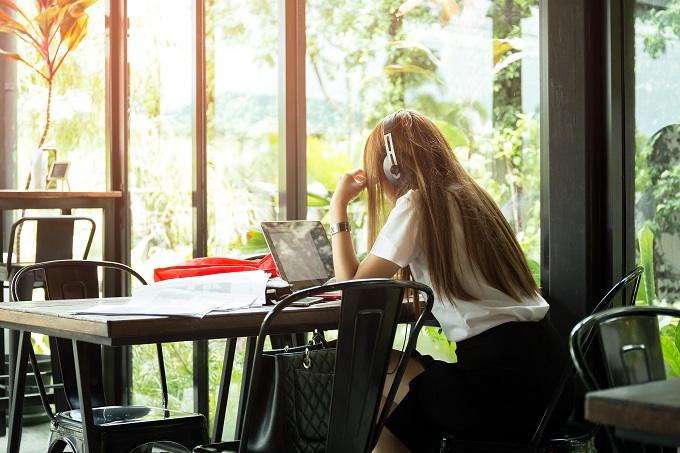
© bignai - stock.adobe.com
<h3>Modern life is full of distractions – and some of them can have a negative effect on our ability to concentrate when studying.</h3>
<p>The problem is that many people tend to underestimate how much they are distracted by what’s going on around them. Here’s how you can get the most from your studies by considering your environment.</p>
<p>Reading is often accompanied by background speech, such as from the television or the conversations of friends or colleagues. When trying to concentrate on a task, people <a href="https://www.ingentaconnect.com/content/dav/aaua/2002/00000088/00000004/art00010" target="_blank">often report</a> that the presence of nearby speech is annoying. But they are usually not very good at accurately <a href="https://asa.scitation.org/doi/10.1121/1.419596" target="_blank">estimating</a> how distracted they will be by such sounds. However, when measured in the lab, people’s ability to carry out study-related tasks is usually made worse by irrelevant speech in the background.</p>
<p>For example, a <a href="https://doi.org/10.1037/xhp0000680" target="_blank">recent study</a> recorded participants’ eye movements as they read texts and listened to irrelevant background speech. The results showed reading needed more effort because participants more often had to go back to previously read words and re-examine them. This distraction occurred because readers were inadvertently trying to listen to the irrelevant speech and process its meaning, even though it has nothing to do with what they are reading.</p>
<p>Listening to music is another common distraction that many students choose. A recent <a href="https://journals.sagepub.com/doi/full/10.1177/1461444814531692" target="_blank">survey</a> found that 62% of university students were listening to music while studying or doing homework. But, again, recent <a href="https://psycnet.apa.org/doi/10.1037/xlm0000544" target="_blank">eye-tracking</a> evidence suggests that listening to music also reduces reading efficiency in a similar way to irrelevant speech.</p>
<p>This may occur because much music contains language in the form of lyrics that readers try to process. In fact, a <a href="https://journals.sagepub.com/doi/full/10.1177/1745691617747398" target="_blank">recent summary</a> of a large number of studies on the topic has suggested that listening to lyrical music may be just as detrimental to text comprehension as listening to speech.</p>
<p>However, listening to instrumental music without lyrics appears to have little if any negative effect on comprehension. So if you must listen to music while you study, it may be better to listen to classical pieces rather than the latest pop hits.</p>
<figure class="align-center "><img src="https://images.theconversation.com/files/298088/original/file-20191022-120204-c57exs.jpg?ixlib=rb-1.1.0&;q=45&;auto=format&;w=754&;fit=clip" sizes="(min-width: 1466px) 754px, (max-width: 599px) 100vw, (min-width: 600px) 600px, 237px" srcset="https://images.theconversation.com/files/298088/original/file-20191022-120204-c57exs.jpg?ixlib=rb-1.1.0&;q=45&;auto=format&;w=600&;h=395&;fit=crop&;dpr=1 600w, https://images.theconversation.com/files/298088/original/file-20191022-120204-c57exs.jpg?ixlib=rb-1.1.0&;q=30&;auto=format&;w=600&;h=395&;fit=crop&;dpr=2 1200w, https://images.theconversation.com/files/298088/original/file-20191022-120204-c57exs.jpg?ixlib=rb-1.1.0&;q=15&;auto=format&;w=600&;h=395&;fit=crop&;dpr=3 1800w, https://images.theconversation.com/files/298088/original/file-20191022-120204-c57exs.jpg?ixlib=rb-1.1.0&;q=45&;auto=format&;w=754&;h=496&;fit=crop&;dpr=1 754w, https://images.theconversation.com/files/298088/original/file-20191022-120204-c57exs.jpg?ixlib=rb-1.1.0&;q=30&;auto=format&;w=754&;h=496&;fit=crop&;dpr=2 1508w, https://images.theconversation.com/files/298088/original/file-20191022-120204-c57exs.jpg?ixlib=rb-1.1.0&;q=15&;auto=format&;w=754&;h=496&;fit=crop&;dpr=3 2262w" alt="" /><figcaption><span class="caption">Avoid technology altogether if you can.</span> <span class="attribution"><a class="source" href="https://www.shutterstock.com/image-photo/concentrated-bearded-man-reading-book-334592630?src=JWB9co5IJk9dzK2OJMj6Fw-1-3" target="_blank">A and I Kruk/Shutterstock</a></span></figcaption></figure>
<h2>The multi-tasking problem</h2>
<p>Even if you find an empty room and take out your headphones, studying today often means dealing with a big potential distraction in the form of smartphones and social media. In one <a href="https://www.sciencedirect.com/science/article/abs/pii/S0360131514000384" target="_blank">study</a>, students conducting three hours of homework engaged with an average of 35 distractors such as using their phone, accessing the internet for non-study purposes or listening to music.</p>
<p>Such types of multi-tasking activities are usually associated with poorer studying <a href="https://educationaltechnologyjournal.springeropen.com/articles/10.1186/s41239-018-0096-z" target="_blank">performance</a>. For example, <a href="https://www.sciencedirect.com/science/article/pii/S0747563214001678" target="_blank">one study</a> found that students who were allowed to send text messages during a lecture had lower comprehension of its contents than those who had their phones switched off. Another recent <a href="https://www.sciencedirect.com/science/article/abs/pii/S036013151930034X" target="_blank">survey</a> found that greater daily Facebook use is associated with an increase in academic distraction.</p>
<p>But while using other media when studying is detrimental to performance, students may not always be aware of this because they tend to overestimate their ability to multi-task. For instance, one <a href="https://link.springer.com/article/10.1007%252Fs10758-015-9266-4" target="_blank">study</a> asked participants to do either one task or two tasks at the same time. The tasks involved judging whether spoken statements are correct and counting the shape of visual objects. Although teenagers and young adults reported strong confidence in their ability to multi-task, their actual performance was almost always worse compared to when they were doing just one task.</p>
<p>Overall, these results suggest that using media when studying should be limited due to the decrease in performance when multi-tasking. One strategy to avoid the negative effects of media multi-tasking is to take short “<a href="https://www.sciencedirect.com/science/article/pii/S0747563212003305" target="_blank">technology breaks</a>” during which you access the internet, but then restrict its use for the rest of your study period. Other <a href="https://educationaltechnologyjournal.springeropen.com/articles/10.1186/s41239-018-0096-z" target="_blank">options</a> may be to avoid using smartphones and other devices before studying is completed for the day, or to keep such technology in communal areas away from the studying space.</p>
<p>So while you might think you can study in a busy cafe, or with the TV on, or with your phone keeping you connected to the world, the chances are that you’re not as good at getting down to work as you think. By planning studying sessions in a way that minimises external distractors, you could improve your concentration and overall performance.<!-- Below is The Conversation's page counter tag. Please DO NOT REMOVE. --><img style="border: none !important; box-shadow: none !important; margin: 0 !important; max-height: 1px !important; max-width: 1px !important; min-height: 1px !important; min-width: 1px !important; opacity: 0 !important; outline: none !important; padding: 0 !important; text-shadow: none !important;" src="https://counter.theconversation.com/content/125624/count.gif?distributor=republish-lightbox-basic" alt="The Conversation" width="1" height="1" /><!-- End of code. If you don't see any code above, please get new code from the Advanced tab after you click the republish button. The page counter does not collect any personal data. More info: http://theconversation.com/republishing-guidelines --></p>
<h6><a href="https://theconversation.com/profiles/martin-vasilev-765947" target="_blank">Martin Vasilev</a>, Postdoctoral researcher, <em><a href="http://theconversation.com/institutions/bournemouth-university-1215" target="_blank">Bournemouth University. </a></em>This article is republished from <a href="http://theconversation.com" target="_blank">The Conversation</a> under a Creative Commons license. Read the <a href="https://theconversation.com/how-to-avoid-distractions-while-studying-according-to-science-125624" target="_blank">original article</a>.</h6>

NZEI Te Riu Roa is considering legal action against the government for the disestablishment of…
NZQA is implementing AI-marking for all Year 10 written assessments from this year onwards, following…
Teaching personal financial responsibility isn't enough. Children should be taught broader economic context, argue New…
When students can't hear the teacher, they can't learn properly. Sound quality matters in education…
The Garden City is rich with learning opportunities, no matter what subject or part of…
Teaching Council of Aotearoa launch school leaders’ stories project with Unteach Racism to challenge institutional…
This website uses cookies.